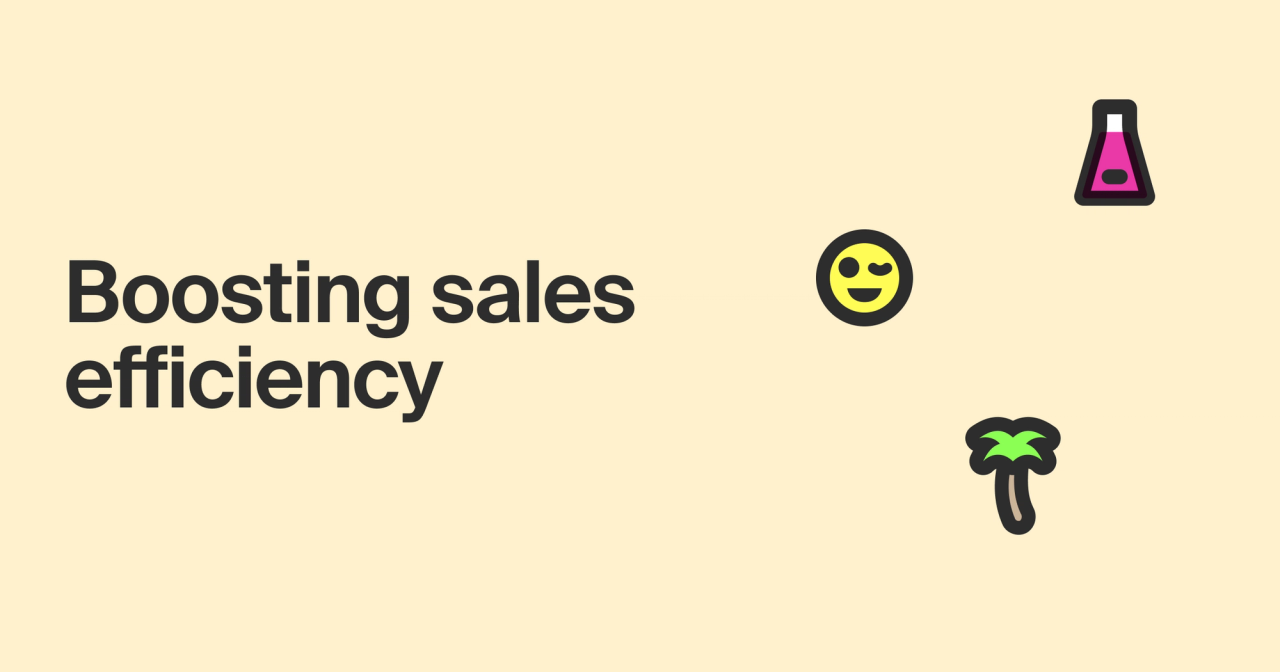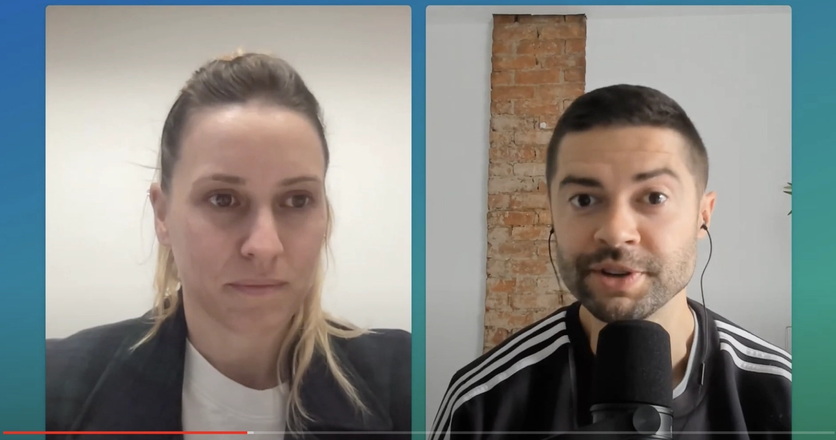It’s hard to do more with less when your customers are doing the exact same thing.
Budgets are smaller, headcount is lower, and company credit cards are in a vice-like grip. In other words: Growth at all costs is dead, long live sales efficiency.
The key to faster, more productive sales cycles? Buyer intent and context.
Forget about brute-forcing your way to deals won. The future is prioritization, personalization, and automation.
Learn how modern go-to-market teams:
- Get higher reply rates
- Identify and prioritize prospects with real intent
- Drive more revenue with half the effort
You can’t get your foot in a closed door
Customers haven’t stopped buying—they’ve just gotten better at it.
Part of it is penny-pinching (that’s what happens when your CFO has to sign off on all new purchases). But the other part is immunity to spray-and-pray tactics.
You can’t book meetings without replies, and most prospects have stopped answering the door for every one-size-fits-all LinkedIn DM. Outreach goes unanswered, discovery call calendars stay empty, and end-of-quarter buzzer beaters never materialize.
If you want to connect with the Glengarry leads, you have to know how and where they raise their hands—and be ready to move quickly when they do.
And you do that by shedding light on your dark funnel.
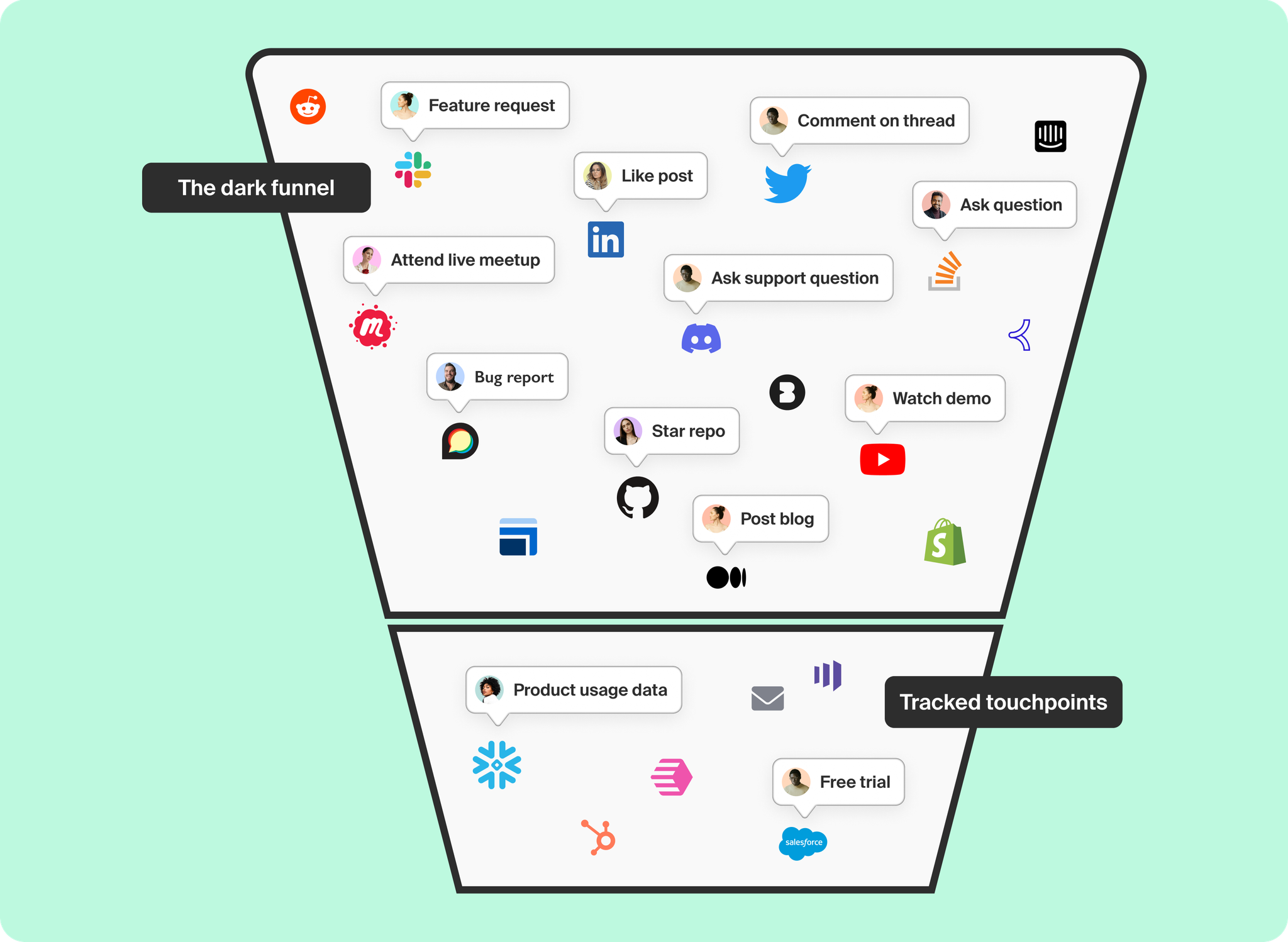
Buyers don’t move in a straight line from website visit to meeting booked. They zig and zag across a vast landscape of digital touchpoints where traditional marketing and sales tools can’t follow. These online communities are where products are researched, recommendations are requested, and vendor stories are swapped.
The good news is this generates a ton of high-value data you can use to reach the right buyers at the right time. The bad news is you can’t access it—at least not without the right tools.
Sales efficiency is chess, not checkers
Bigger isn’t always better when it comes to your tech stack. Go-to-market teams have a mountain of toys to play with, but none were built for the dark funnel.
Reporting across digital channels is tethered to individual platforms, which makes it nearly impossible to connect the dots between a prospect’s activity in multiple channels (let alone get a unified view of customer activity at scale).
Even if teams were able to centralize this information, there’s no way to tie cloudy top-of-funnel activity (think product recommendation requests posted in a LinkedIn thread) to the activities recorded in your product or the identities stored in your CRM.
From forums like Reddit and Stack Overflow to social channels like YouTube and Twitter, GTM teams are blind to buyer intent, the people behind it, and the context for where those people are in the customer journey.
Account-based marketing tools and intent providers claim to bridge the gap. But the signals they provide are at the account level (good luck personalizing that email to the anonymous individual at your target account who recently read a blog post and bounced).
This bleeds over into prioritization. It’s not enough to generate high-intent leads—you need to make sure they’re high-fit, too. But matching purchase intent to product and customer fit is a tall order (even taller than keeping sales teams alerted to movement from those leads in the first place).
Your teams on the ground (those connecting with customers day in and day out) end up sifting through a sea of digital interactions by hand. While they’re trying to stitch together data siloed in CRMs, ABM tools, and more, their colleagues are left blasting out messages to people who don’t respond and wasting time on cold leads instead of the opportunities they should be prioritizing.
To get higher response rates, book more meetings with the right buyers, and move on opportunities in the moment, you have to uncover real buyer intent, prioritize which deals deserve your time, and follow up at speed:
| Track the entire customer journey | Spot the signal from the noise | Take action and automate |
|---|---|---|
Connect all your critical customer touchpoints in a single place. | Identify and prioritize the people behind the buying behaviors. | Simplify and scale how teams stay alerted to and follow up on opportunities. |
Our research showed that nearly 30% of opportunities originate in communities before ever appearing in your CRM.
Your sales team only gets 5% of your buyer’s time. What it needs is visibility into the other 95%.
Boost sales efficiency using Common Room
Common Room helps you uncover and use buyer intent and context from real-time dark-funnel activities. That way GTM teams can:
- Surface intent from high-fit prospects at all stages of the buying cycle
- Connect activity to actual people instead of anonymous accounts
- Alert team members to high-intent actions from target accounts the second they happen
- Create detailed prospect lists to prioritize outreach
- Guide team members to reach out on the right channels and at the right time
This means higher response rates, more meetings set, and less wasted time.
Here’s how modern GTM teams do it:
Reveal the entire customer journey
You begin by centralizing all your data—customer, product, and previously siloed community data—in Common Room. This provides you with end-to-end visibility of the customer journey, from general awareness to decision-making.
Your data is automatically merged and enriched to reveal the identities of your dark-funnel prospects. This lets you see which buyers are both high-intent and a good fit for your ICP.

🎤 "Common Room has allowed us to better see all the organizations who are in our community. We can definitively show member engagement from larger companies in our core markets.”
—Marie Antons, Technical Community Manager at Harness
Recognize the right opportunities
Now it’s time to decide which opportunities to go after using Common Room’s filters.
You can get as granular as you want by applying multiple filters and easy-to-use business logic, such as “and,” “or,” and “not” operators. This helps you zero in on the specific people and companies you’re interested in so you can build better prospect lists, prioritize your time, and personalize your messaging.
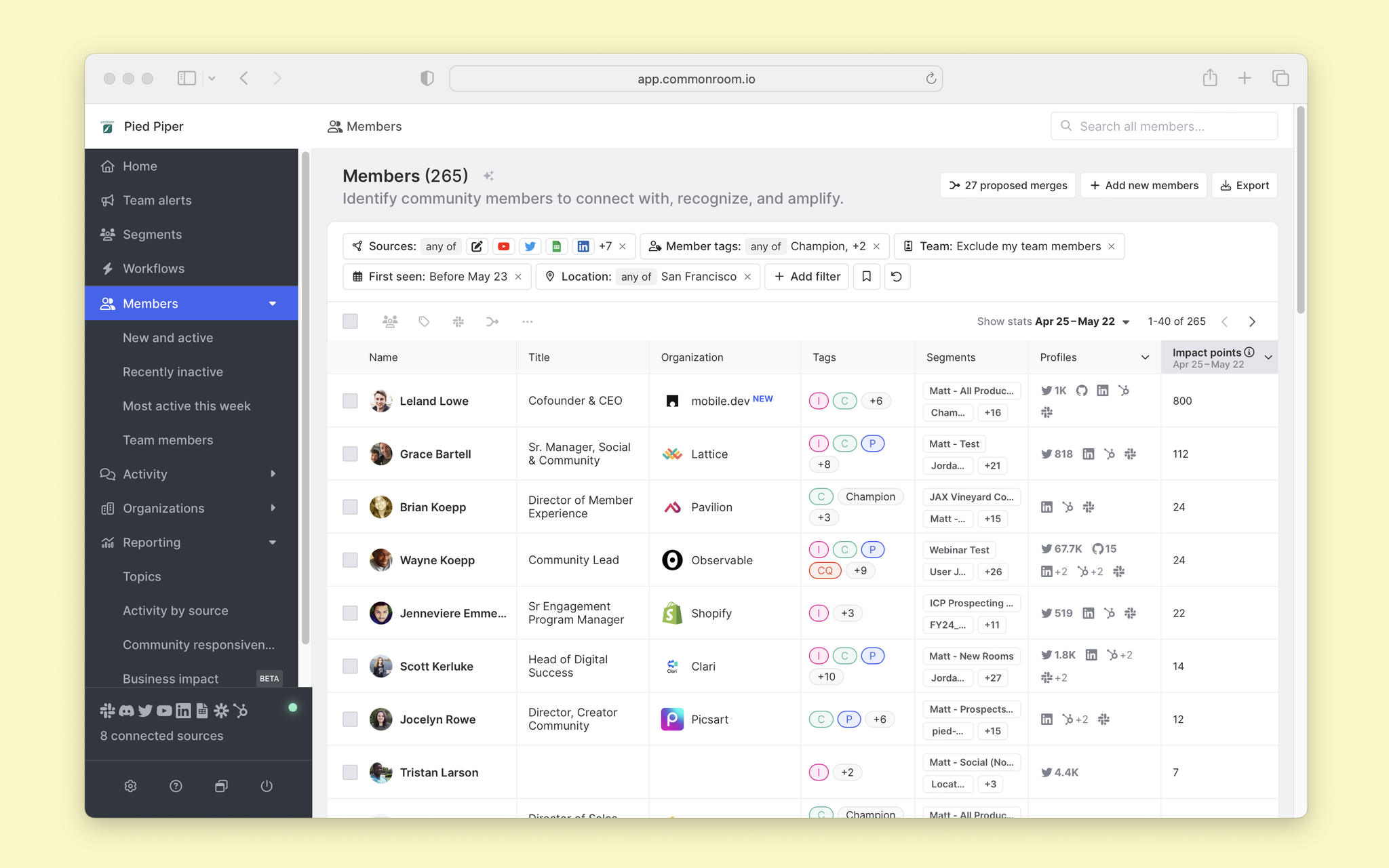
🎤 “Not only does Common Room help us save time by getting to the most important conversations faster, it has become core to how we prioritize which organizations we spend our time with."
—Tim Hughes, Vice President of Sales at Temporal
Speed up customer connection
Once your prospect list is sliced and diced, you can create reactive segments to organize outreach and track status updates for different customer cohorts. You can reach out to people individually or take action across entire segments at once.
After you create a segment, you can employ workflows to automatically refresh it based on changing buyer behaviors. Workflows also allow you to automate alerts so you stay up to date on any predefined events the moment they happen.
This takes the guesswork (and grunt work) out of staying focused on your biggest and best opportunities.
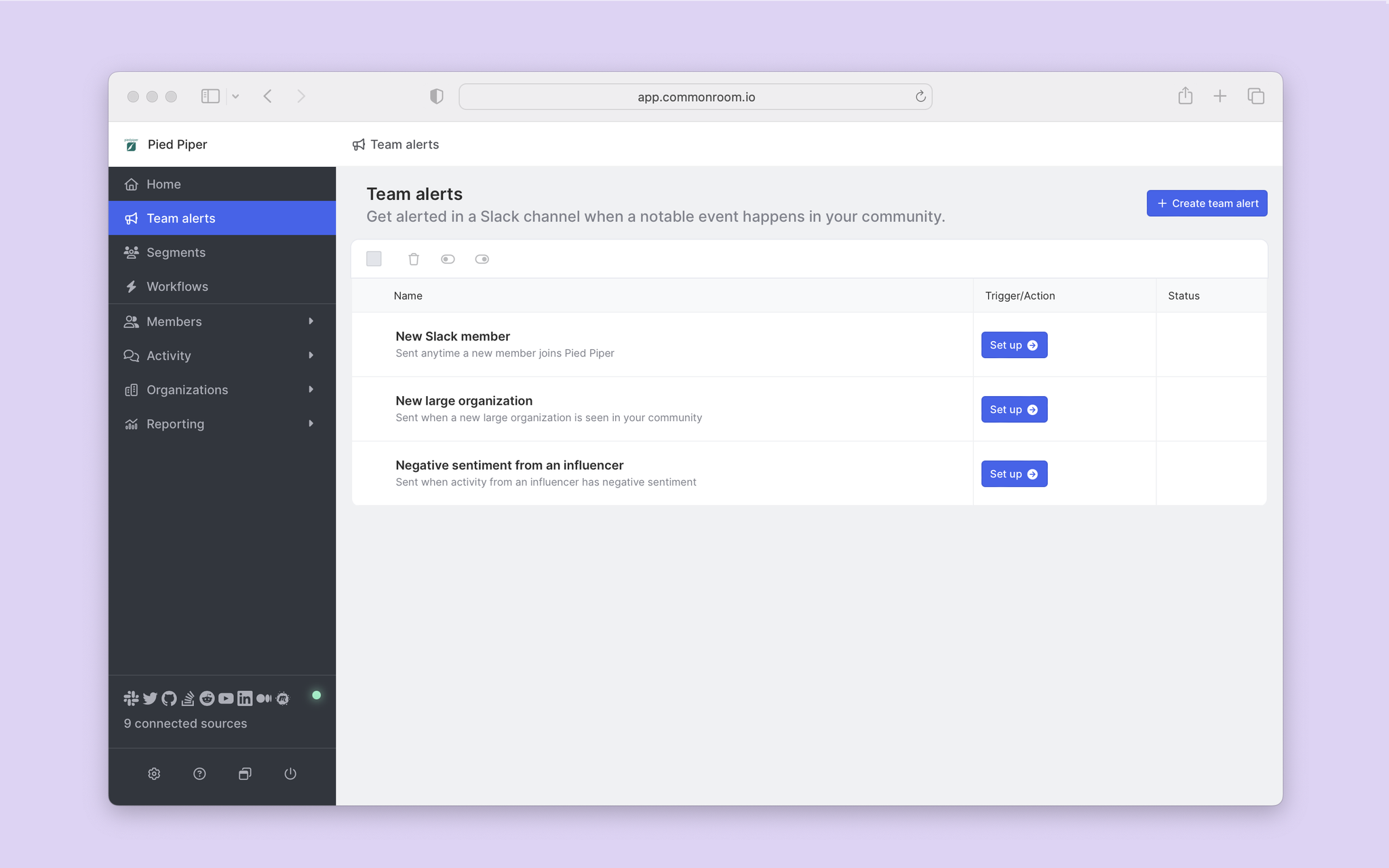
🎤 "Common Room empowers us to take action in a very direct way that clearly ladders up to the success of our business.”
—Joshua Zerkel, Head of Global Engagement Marketing at Asana
This strategy has helped Common Room customers find and engage the right buyers at the right time, as well as close deals 20% faster.
🎤 "What's really exciting about Common Room is that you can detect interest prior to a user actually raising their hand, and you can start creating avenues by which they can more quickly get to you."
—Tim Hughes, Head of Sales at Temporal
Sales efficiency isn’t just a motto—it’s a methodology. Modern GTM teams use Common Room to put it in practice.
Do more with less and hit your quota with Common Room
Ready to see how Common Room helps you drive customer engagement and follow up faster?
